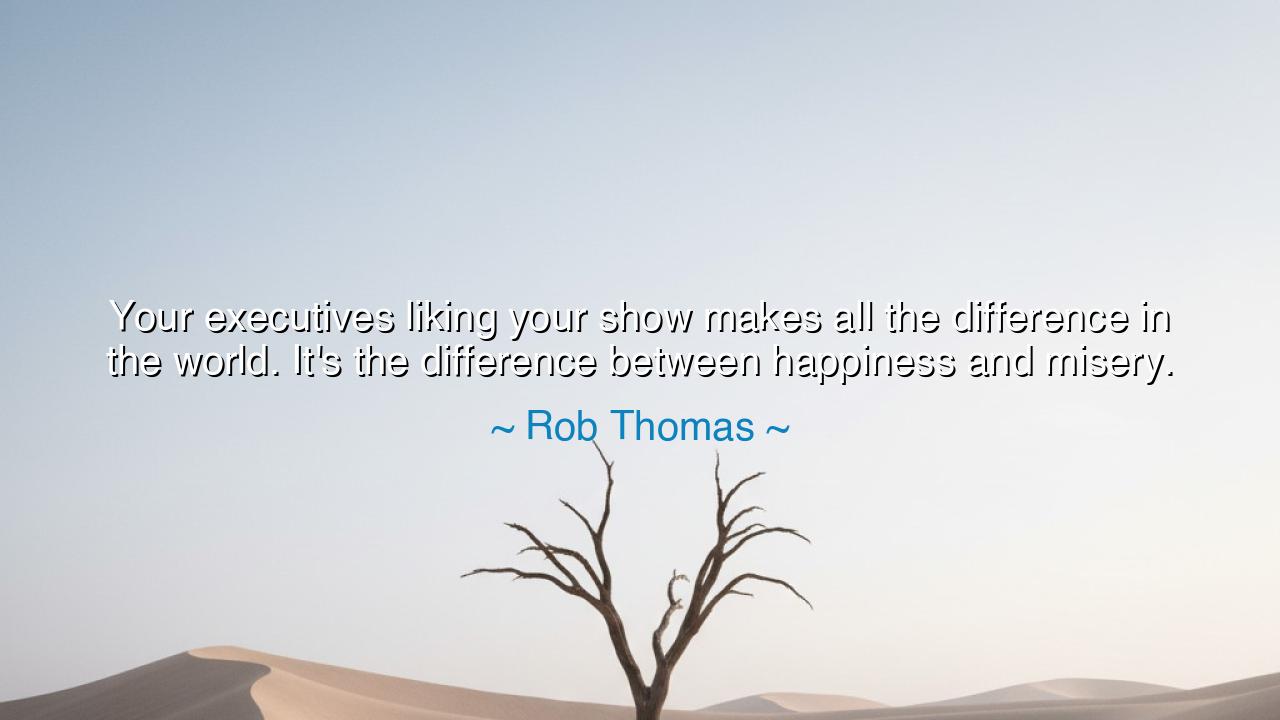
Your executives liking your show makes all the difference in the
Your executives liking your show makes all the difference in the world. It's the difference between happiness and misery.






In the words of Rob Thomas, “Your executives liking your show makes all the difference in the world. It’s the difference between happiness and misery,” we hear the weary yet truthful voice of an artist who has walked through the fire of creation within the halls of power. These words, though rooted in the world of television, speak to a universal truth about approval, validation, and the struggle between art and authority. Beneath their simplicity lies the eternal tension between the creator and the gatekeeper, between the soul that dreams and the hand that decides whether that dream shall live or die. Thomas, the mind behind shows like Veronica Mars and Party Down, knew that even the purest creative flame must sometimes flicker under the breath of those who fund and command.
The origin of this quote lies in the harsh reality of the entertainment world, where art and commerce are forever entwined. To make a show is to pour one’s heart into form — to shape emotion, story, and meaning from imagination. But the creator’s vision must pass through the judgment of others: producers, networks, executives. Their favor can grant the work life, their disapproval can extinguish it. Thus, Thomas’s words are not a complaint, but a revelation — that in a world where art depends on systems of power, the emotional fate of the artist is tied to the approval of those in control. When the gatekeepers smile, the heart of the artist soars. When they frown, the spirit collapses into silence.
But this truth is not new. Even in ancient times, the artist served a master. The sculptors of Greece labored under kings and priests; the poets of Rome depended on the goodwill of patrons. Consider the tale of Michelangelo, summoned by Pope Julius II to paint the Sistine Chapel. The great artist longed for freedom, yet his life and livelihood hung upon the pope’s favor. When Julius thundered in impatience, Michelangelo trembled between genius and despair. Yet out of this tension — between vision and authority, between creation and constraint — was born one of humanity’s greatest masterpieces. Like Rob Thomas centuries later, Michelangelo learned that the artist’s happiness often depends not only on talent, but on the mercy of power.
There is, however, a deeper current running through Thomas’s reflection — a recognition that happiness and misery in creative life are not solely determined by external approval, but by the artist’s inner reconciliation with reality. To live as a creator is to live vulnerably, for one’s soul is constantly exposed to the judgment of others. But those who endure — who continue to create despite rejection — are those who discover a higher form of validation, one born not of others’ praise, but of self-truth. The wise artist learns to take joy in the act itself, even when the world withholds its applause.
Yet still, Thomas’s words remind us of the human longing for recognition. We are not islands, nor are our creations made in isolation. Every soul seeks to be seen, to have its labor acknowledged. The worker desires his master’s praise; the child seeks a parent’s approval; the artist craves the nod of those who hold the keys to their destiny. It is not weakness, but nature — for acknowledgment affirms that one’s efforts have meaning in the eyes of the world. But the danger lies in dependence, for when our happiness is bound wholly to others’ opinions, our freedom withers.
To transcend this, one must walk the narrow bridge between humility and independence. Let the approval of others be welcomed, but not worshiped. Take joy when it comes, but let it not define your worth. If fortune smiles and the executives like your show, rejoice — for it may mean your work lives on. But if they do not, create still. For the true artist’s duty is not to please, but to express truth; not to seek favor, but to give form to vision. Even in rejection, creation is victory.
Thus, the lesson of Rob Thomas’s words extends far beyond the studio or stage. It is the teaching of all who labor under judgment: that while approval can bring comfort, only purpose brings peace. Do your work with excellence; seek mastery, not flattery. Accept praise with gratitude, but do not let its absence silence you. For happiness that depends on another’s favor is fragile, but happiness that flows from faith in one’s craft endures even in the shadows.
And so, remember this, O seeker of creation: the world may hold your fate, but only you hold your fire. Let others’ approval be the wind that fills your sails, but not the tide that steers your soul. For in the end, happiness and misery are not decided by the hands of executives or kings — but by the spirit that dares to keep creating, even when no one is watching.






AAdministratorAdministrator
Welcome, honored guests. Please leave a comment, we will respond soon